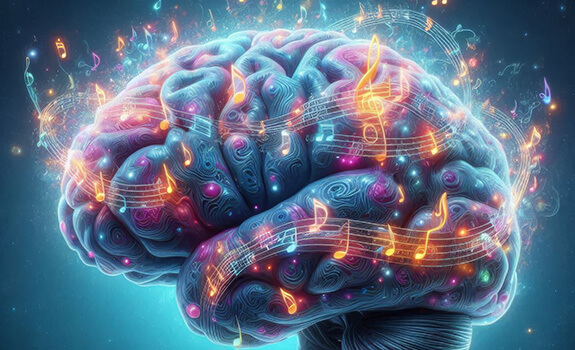January 16, 2025
The Sounds of Healing

By Ram Rao, Ph.D., Principal Research Scientist for Apollo Health
Music plays an integral role in our daily lives, uplifting our spirits, motivating us during exercise, or helping us relax before sleep. Its profound influence is undeniable, which explains why it is increasingly integrated into medical treatments, particularly for dementia. Studies have shown that music can significantly improve the quality of life for individuals with dementia, even when other forms of communication become difficult. Researchers continue to make remarkable progress in leveraging music to support dementia patients, demonstrating its ability to reduce anxiety and depression, enhance well-being for both patients and caregivers and alleviate various stresses.
Music therapy — whether through playing, singing or simply listening — has proven to be highly effective. About a decade ago, scientists discovered that listening to music activates multiple brain regions, including the limbic system (which governs emotions and memory), cognitive areas (responsible for perception, learning, and response), and motor regions (which control voluntary movement). This breakthrough challenged earlier beliefs that music processing was limited to specific parts of the brain, highlighting its unique and widespread neurological effects.
Research suggests that music may support brain regeneration and improve neural connectivity. Since many forms of dementia involve the degeneration of brain cells, music offers the potential to repair or strengthen impaired neural pathways, providing new hope for individuals with dementia. Familiar and beloved music often has the most significant impact on neural regeneration. Deeply tied to memory and emotion, such music can trigger the release of feel-good hormones, bringing joy and comfort. Curated playlists of favorite songs can also help alleviate daily stress. This is particularly important for individuals with Alzheimer’s and other forms of dementia, as the brain regions associated with musical memories are less affected by these conditions. This explains why people with Alzheimer’s dementia often retain memories connected to their favorite music. Listening to music can help manage symptoms like distress, agitation, and “sundowning,” a state of increased confusion that occurs later in the day. A small study by the Cambridge Institute for Music Therapy Research further underscored music’s remarkable effects on dementia patients. Repeatedly listening to favorite songs led to noticeable changes in heart rate and physical movements, directly showcasing the powerful influence of music.
The emotional and social benefits of music are equally profound. It fosters a connection between patients and their loved ones, creating shared moments of joy and communication. Singing a favorite song together or reminiscing about music tied to meaningful life events can strengthen bonds and provide much-needed comfort in the face of a challenging illness. Research studies show that music profoundly influences the structure and function of the brain in several key ways:
1. Eliciting Memories: Music is strongly connected to memory; familiar songs from a person’s past can evoke emotions and recollections even when verbal communication is limited. Music from one’s youth often remains accessible longer than other memories.
2. Reducing Anxiety and Agitation: People with dementia often experience anxiety, restlessness, or agitation, particularly during “sundowning” periods. Music provides a calming influence, offering familiarity and comfort.
3. Improving Mood: Listening to music can elevate mood, help reduce feelings of loneliness or depression, and even promote laughter or joy. This is particularly beneficial in caregiving environments, where a positive emotional state can improve daily interactions and overall well-being.
4. Encouraging Movement: The rhythmic elements of music can inspire physical activity, even in those with mobility challenges. Patients may clap, tap their feet, or dance, promoting physical exercise and enhancing well-being.
5. Facilitating Social Interaction: Music naturally brings people together. In group settings, it can foster a sense of belonging and encourage social interaction, even for those who struggle with social engagement.
6. Supporting Cognitive Function: Music has been shown to stimulate brain activity, potentially slowing cognitive decline. Music therapy, including singing or playing instruments, engages multiple brain regions, providing therapeutic benefits.
7. Providing Emotional Expression: For individuals who have lost the ability to speak, music offers a powerful outlet for emotional expression. Singing, even in a limited capacity, allows them to communicate feelings that words can no longer convey.
8. Building a Routine: Incorporating music into daily routines creates structure and predictability, helping people with dementia feel more secure and reducing confusion as they navigate their day.
In conclusion, music is far more than a form of entertainment for individuals with dementia — it is a powerful therapeutic tool. By accessing preserved areas of the brain, managing symptoms, and creating opportunities for connection, music offers a unique and meaningful way to enhance the quality of life for those affected with Alzheimer’s and other forms of dementia and their caregivers as well. As research continues to uncover its potential, the role of music in dementia care will undoubtedly grow, bringing hope and healing to countless individuals.




